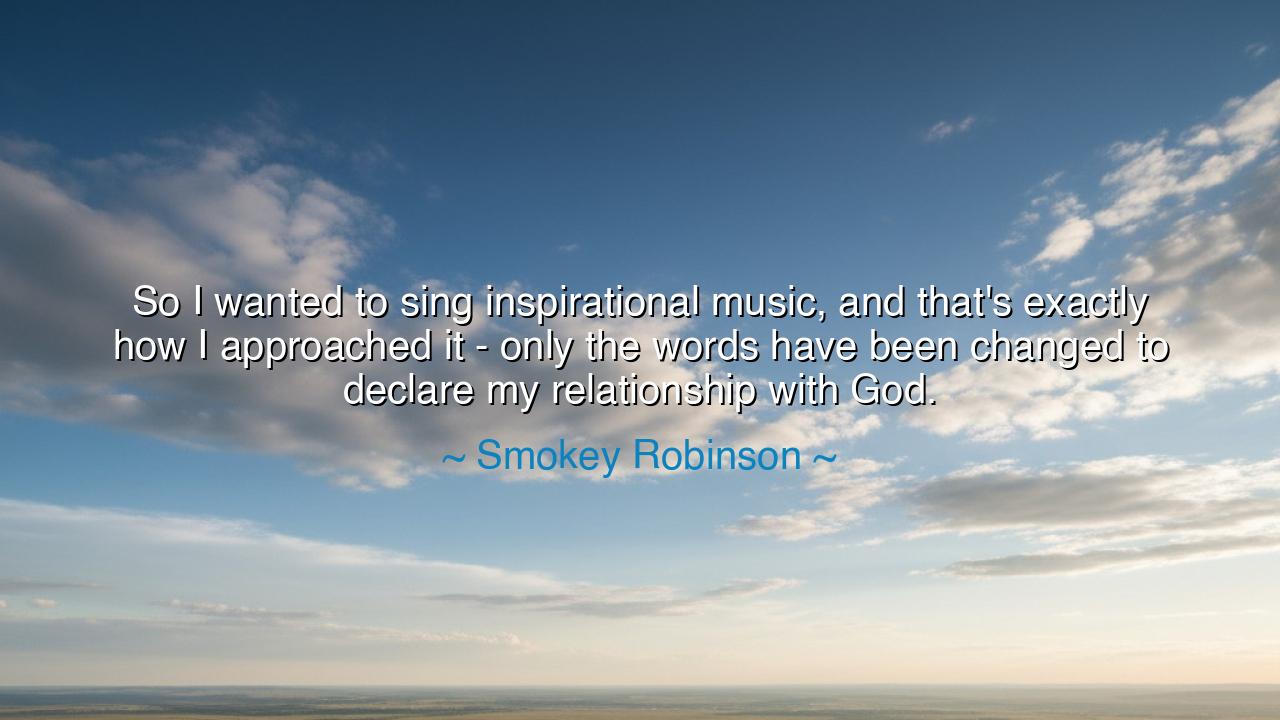
So I wanted to sing inspirational music, and that's exactly how I
So I wanted to sing inspirational music, and that's exactly how I approached it - only the words have been changed to declare my relationship with God.






In the words of Smokey Robinson, the poet of soul and the minstrel of Motown, we hear a confession both tender and transcendent: “So I wanted to sing inspirational music, and that’s exactly how I approached it — only the words have been changed to declare my relationship with God.” These are not merely the words of a musician, but of a seeker — one who has walked the long road from earthly adoration to divine devotion. In them lies the eternal truth that art, at its highest purpose, becomes worship — a bridge between the human heart and the infinite mystery that made it beat.
For Smokey Robinson, whose voice once serenaded generations with the melodies of love and longing, this revelation marked a turning of the soul. He had sung of passion, heartbreak, and human affection — all the beauty and ache of mortal love. But over time, he saw that these same emotions, purified and elevated, could serve a greater song. The inspirational music he sought was not a rejection of what came before, but its transformation. The lyrics changed, yet the essence — the rhythm of sincerity, the pulse of yearning — remained. What had once been sung to another person became a hymn to the Creator. In this, Robinson followed a path known to the ancients: to turn art, once bound to the world, toward the divine.
Throughout history, such transformations have marked the journeys of great artists and saints alike. Consider Saint Augustine, who, before his conversion, sought joy in the pleasures of the world — the theater, the tavern, the applause of men. Yet when his heart was turned toward God, he did not abandon his eloquence or his passion. He redirected them. The same fire that once glorified himself now glorified truth. So it was with Smokey Robinson: his art did not die when his faith deepened — it was reborn. His music became not merely a sound, but a prayer; not merely entertainment, but inspiration.
When Robinson says “only the words have been changed,” he speaks to something deeper than lyric — he speaks to the continuity of the soul’s calling. The gift of creativity, whether in music, poetry, or craft, is eternal. It is the channel through which the divine breath flows. But it is the intention that sanctifies it. A song of romance can become a psalm; a melody of sorrow can become a cry for salvation. The ancient mystics knew this truth well: that the same instrument that sings of desire can sing of devotion, for both are born of the same longing — the desire to connect, to love, to belong to something greater than oneself.
In his journey, Robinson also reminds us of the humility required to acknowledge the source of one’s gift. To say, “I wanted to sing inspirational music,” is to recognize that art without purpose can become hollow. The artist, like the prophet, must eventually turn toward meaning. His decision to declare his relationship with God was not merely artistic — it was spiritual renewal. He chose to lift his voice not only to move the body, but to awaken the soul. In this, he stands in the company of those who understood that the truest art serves not ego, but enlightenment.
Such is the eternal dance between artist and Creator. In ancient Greece, the poets would begin their verses by invoking the Muse, the divine spark of inspiration. In India, the raga was born as an offering to the gods, each note aligned with celestial harmony. In the cathedrals of Europe, composers like Bach signed their works with the initials “S.D.G.” — Soli Deo Gloria — “To God Alone the Glory.” Smokey Robinson’s declaration belongs to that same lineage. Though his language is modern, his spirit is ancient: the belief that to create is to commune with the divine, that every act of beauty is a reflection of its eternal source.
So, dear listener, let this be your lesson: whatever your gift, whatever your craft, let it become inspirational. Do not silence the part of you that longs to create, but sanctify it with purpose. Change the words if you must, as Robinson did, but keep the melody — the melody of authenticity, of joy, of gratitude. If you write, write with compassion; if you work, work with integrity; if you love, love with reverence. For when your actions, like Smokey’s music, become an expression of your relationship with the divine, then your life itself becomes a song — a hymn of beauty, truth, and light that echoes far beyond the limits of time.
Thus, through the voice of Smokey Robinson, we are reminded that art is not an end, but a path — one that leads from the heart of man to the heart of God. To create with inspiration is to awaken others, and to awaken others is to serve the eternal. Let your creation, whatever form it takes, be not only your expression, but your offering. For one day, when the world hears your song — whether sung, spoken, or lived — may they, too, feel the divine rhythm within, and know that they have touched something holy.






AAdministratorAdministrator
Welcome, honored guests. Please leave a comment, we will respond soon